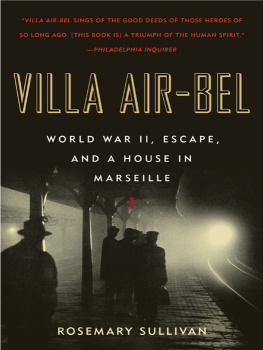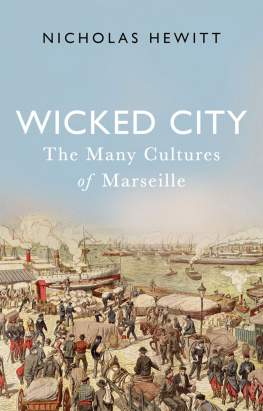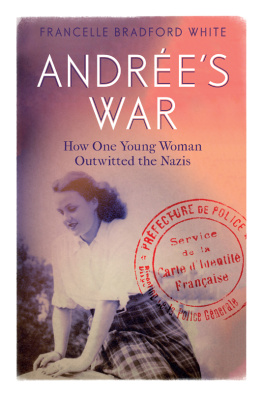For Arlene Lampert,
my dearest friend and most exacting reader
And in loving memory of my father,
Michael Patrick Sullivan
They cannot imagine that the things they lived for could disappear. They cannot believethat something essential could disappear, that a whole spiritual realm is threatened. They do not believe in major historical upheavals that obliterate all traces of previous generations and entirely transform continents. They do not believe that what seems to them unjust is possible.
A NTOINE DE S AINT -E XUPRY
There is no escape from yesterday because yesterday has deformed us, or been deformed by us.
S AMUEL B ECKETT
(United States Holocaust Memorial Museum)
(Varian Fry Papers, Rare Book and Manuscript Library, Columbia University)
(Collection of Annette Riley Fry)
(Collection of Madame Hlne Ungemach-Bndite)
(Collection of Jean Gemhling)
(Varian Fry Papers, Rare Book and Manuscript Library, Columbia University)
(Collection of Madame Hlne Ungemach-Bndite)
(Pablo Picasso, 1937, 2006 Estate of Pablo Picasso/ARS, NY)
( Corbis)
(Photo by Juan Opitz)
(Varian Fry Papers, Rare Book and Manuscript Library, Columbia University)
( 2003 by Addison-Wesley Education Publishers Inc. Reprinted by permission of Pearson Education, Inc.)
(Varian Fry Papers, Rare Book and Manuscript Library, Columbia University)
(Collection of Annette Riley Fry)
(United States Holocaust Memorial Museum)
(Collection of Madame Hlne Ungemach-Bndite)
(United States Holocaust Memorial Museum/Varian Fry Papers, Rare Book and Manuscript Library, Columbia University)
(Collection of Charles Ebel)
(Collection of Jean Gemhling)
(Varian Fry Papers, Rare Book and Manuscript Library, Columbia University)
(Varian Fry Papers, Rare Book and Manuscript Library, Columbia University)
(Collection of Aube Elleouet Breton)
(Collection of Aube Elleouet Breton)
(Varian Fry Papers, Rare Book and Manuscript Library, Columbia University)
(United States Holocaust Memorial Museum)
(Collection of Annette Riley Fry)
(Collection of Annette Riley Fry)
( Bettmann/Corbis)
(Collection of Aube Elleouet Breton)
(Collection of Madame Hlne Ungemach-Bndite)
(United States Holocaust Memorial Museum)
(Collection of Jean Gemhling)
(Varian Fry Papers, Rare Book and Manuscript Library, Columbia University)
(Collection of Madame Hlne Ungemach-Bndite)
I t was slightly after 4 A.M. on the morning of September 25, 1940, when Lisa Fittko opened the door of the inn in the seaport town of Banyuls-sur-Mer and looked apprehensively up avenue Puig del Mas. After seven years on the run, she had grown adept at controlling her panic. She looked across at the harbor and listened for the sound of the waves beating on the shore. She tried to match her breathing to that calming rhythm. She glanced at the mayors office on the central square. The gendarmes would not be arriving for hours yet. Up the avenue to the right, she noted that the vineyard workers had already begun to come out of their houses. It was time to leave.
She turned to the two people behind her and told them to put on the espadrilles they would need for the rough climb up the mountain. She gestured for them to follow her and reminded them again not to speak. Their German accents would betray them. The woman was a stranger to her, but Lisa believed she could be trusted not to lose her nerve. The boy, just sixteen, had been through enough to know the danger they were in. The two had understood immediately when she told them there was always someone watching and they must carry nothing but a small knapsack in order not to draw attention to themselves. Not that they had anything to carry. They had already lost everything.
The three walked slowly up the avenue, the women first, the boy trailing behind. In the waning moonlight, Lisa could make out the silhouette of the church tower. Only the previous week she had sat in its garden, contemplating the autumn butterflies gorging on the last sweet tastes of life. On that day, the Spanish simplicity of the churchs faade with its three bells consoled her and the gothic mausoleums lined up like sentinels in the graveyard had made her think, then, of sanctuary. Now, though, the idea of the dead witnessing this flight through the blackness made her shudder.
She thought of her husband, Hans, who was still in Marseille. Hed sent her these strangers to guide over the mountains to freedom. For a moment she was almost angry with him. Why was it always they who had to risk their lives to save someone else? Theyd been fighting Fascism since 1933 when Hitler first came to power and theyd fled, distributing anti-Fascist tracts as they ran across borders, first Czechoslovakia, then Switzerland, and now France. She knew that Hans was constitutionally incapable of abandoning his convictions. They were young, he said, and someone had to stay and fight.
She turned left at the railway bridge and her companions quietly followed. Now came the precipitous climb up stone steps into the vineyards. She could feel the cold wind, the tramontane , against her cheeks, bringing the exhilarating smell of the sea and lifting her courage. They mingled amid the vineyard workers who were moving casually through the darkness, their spades slung over their shoulders, their cabecs for carrying earth swinging with the motion of their footsteps. The workers were pointedly ignoring them. It was not the first time they had seen worried strangers slipping over the mountains. A year ago the refugees had been pouring into France because of the Spanish Civil War. Now the flight was reversed, back into Spain, away from the Gestapo and the French police, away from a country trapped in the totalitarian vise of irrational hatred. Lisa knew the vineyard workers, so accepting of lifes patient seasonal pace, would not betray them.

She could smell the mature grapes hanging from the vines and felt their weight. The ritual of the harvest was about to begin. It shocked her to think about how life continued, oblivious to her fear. The light was lifting, and she glanced up at the hills to see if the border patrols, the gardes mobiles , were already on duty. If the three of them were spotted, she could offer no explanation for the presence of two women and a boy making their way through the alleys of vines up into the mountain. They would be arrested as apatrides , stateless people, without the papers that gave them the right to be walking on this ancient ground. It would mean immediate transportation to an internment camp.
They moved up, still unnoticed, into the foothills. Lisa looked at the crude chart on the paper she held in her hand. She noted theyd passed the empty stable marked on the map. They were obviously going in the right direction. Then they reached the huge landmark boulder.
Now she was looking for the old man. Yesterday she had wanted these people to see the climb they were in for and so shed walked them up to the meadow. The daytime hikers were not suspicious and no one had stopped them. The old man had insisted on carrying his black leather briefcase. In frustration, she tried to dissuade him. She was sure the heavy briefcase would give them away, but he said it contained his new manuscript, which he valued more than his life. Then, to her shock, when theyd reached the meadow, he refused to return to the town. He was halfway, he said. He could not climb down and start again from the bottom. He was going to sleep on the mountain overnight. He would meet them in the morning.











